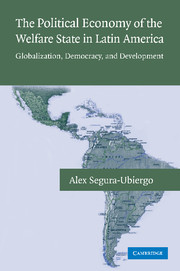 The Political Economy of the Welfare State in Latin America
The Political Economy of the Welfare State in Latin America Book contents
- Frontmatter
- Contents
- Tables and Figures
- Acknowledgments
- 1 Introduction
- 2 The Historical Evolution of Welfare Systems in Latin America: Qualitative Comparative Analysis
- 3 Theoretical Framework and Main Hypotheses
- 4 Determinants of Social Spending in Latin America: A Time-Series Cross-Section Analysis, 1973–2003
- 5 Chile: A Classic Latin American Welfare State under Authoritarian Stress (1973–1989) and Democratic Reinvention (1990–2000)
- 6 Costa Rica: Globalization, Gradual Reform, and the Politics of Compensation, 1973–2002
- 7 Peru: Political Instability, Regime Change, and Late Economic Reform in a Non-Welfare State, 1973–2000
- 8 Conclusion: Summary and Final Reflections on the Sustainability and Effectiveness of Latin American Welfare Systems
- Bibliography
- Index
2 - The Historical Evolution of Welfare Systems in Latin America: Qualitative Comparative Analysis
Published online by Cambridge University Press: 10 July 2009
- Frontmatter
- Contents
- Tables and Figures
- Acknowledgments
- 1 Introduction
- 2 The Historical Evolution of Welfare Systems in Latin America: Qualitative Comparative Analysis
- 3 Theoretical Framework and Main Hypotheses
- 4 Determinants of Social Spending in Latin America: A Time-Series Cross-Section Analysis, 1973–2003
- 5 Chile: A Classic Latin American Welfare State under Authoritarian Stress (1973–1989) and Democratic Reinvention (1990–2000)
- 6 Costa Rica: Globalization, Gradual Reform, and the Politics of Compensation, 1973–2002
- 7 Peru: Political Instability, Regime Change, and Late Economic Reform in a Non-Welfare State, 1973–2000
- 8 Conclusion: Summary and Final Reflections on the Sustainability and Effectiveness of Latin American Welfare Systems
- Bibliography
- Index
Summary
Why have some Latin American countries historically developed more extensive welfare states than others? What is the relative importance of economic development, trade openness, democracy, and left-labor power on the evolution of Latin America's public welfare systems? This chapter asks which combinations of economic and political factors contributed to the expansion of welfare systems in different groups of Latin American countries. For analytical purposes, it is useful to distinguish between the origins and consolidation of the welfare state, on the one hand, and its expansion and development, on the other. A study of the origins of the welfare state, both in advanced capitalist democracies and in Latin America, would require a careful analysis of the economic and political factors that led to the passage of the first social security and welfare laws in the 1920s and 1930s (earlier for some countries). By contrast, an analysis of the development of the welfare state would focus on the socioeconomic and political factors that transformed initial social legislation into increasingly greater welfare entitlements and public health and educational systems. The analysis in this chapter refers briefly to the origins of Latin American welfare systems in the 1920 and 1930s but focuses more extensively on their consolidation and expansion from the 1940s to the late 1970s – a historical period in which the largest Latin American economies were following ISI policies that kept them relatively closed to international markets.
- Type
- Chapter
- Information
- The Political Economy of the Welfare State in Latin AmericaGlobalization, Democracy, and Development, pp. 24 - 76Publisher: Cambridge University PressPrint publication year: 2007


